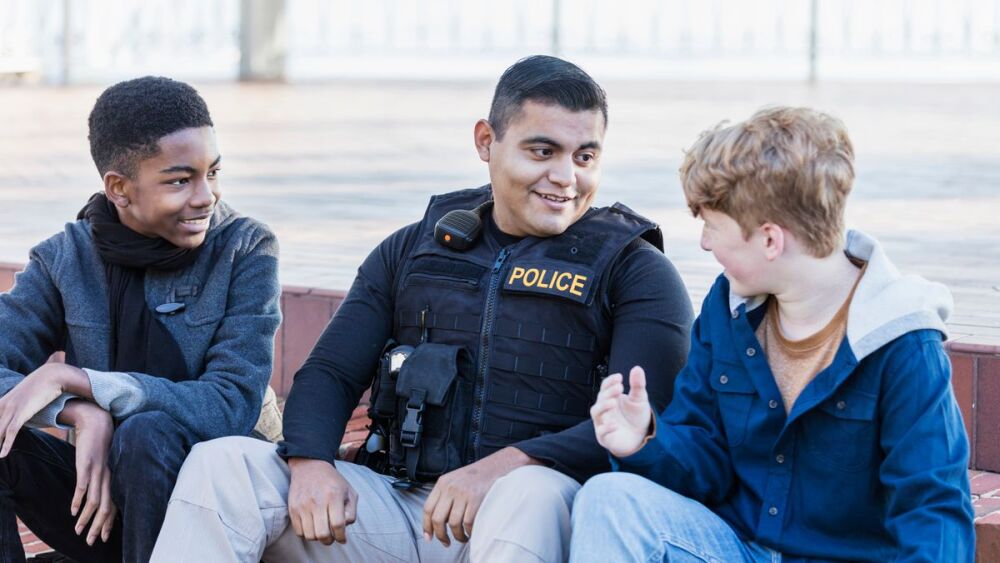By Charles B. Freitag Jr., Ph.D.
Patrol officers often serve as the first point of contact for juveniles within the criminal justice system. [1] With over 468,000 full-time officers in municipal police departments, nearly 70% are on patrol, highlighting the crucial role they play in juvenile encounters. [2] Effective training for officers on the developmental differences between juveniles and adults can enhance these interactions, fostering positive relationships and better outcomes for youth.
Challenges in police-youth encounters
Research indicates that both police officers and juveniles often have negative perceptions of each other. [3] Officers frequently view juveniles as problems to manage, while youth often see the police negatively. These encounters can lead to adverse outcomes for juveniles, including decreased school attendance, mental health issues and ongoing negative interactions with law enforcement into adulthood. [4]
Adolescent brain science training
Adolescents’ brains are not fully developed, particularly the prefrontal cortex responsible for decision-making and emotional regulation. [1] This makes them more impulsive, susceptible to peer pressure and less able to foresee consequences compared to adults. Training officers to understand these developmental stages can improve their interactions with juveniles.
Most officers receive minimal training on adolescent brain science despite frequently dealing with juveniles. [5] Studies show that training on de-escalation techniques and recognizing trauma in youth leads to better officer attitudes and more positive interactions with juveniles. One training that works is crisis intervention team training for youth (CIT-Y). [6] Officers completed pre- and post-test interviews, and researchers learned that officers reported improved perceptions and knowledge of juveniles with mental health issues. Follow-up interviews revealed that officers reported better work performance. CIT-Y training focuses on cross-system responses for justice-involved youth and can be accessed here.
Programs that work
Programs that build positive relationships between police and youth in non-confrontational settings have shown promise. These programs improve youth perceptions of police and vice versa, reducing the likelihood of confrontational encounters.
One program that works is a five-week program called Team Kids Challenge. [7] Team Kids Challenge involved police and youth working together in a non-enforcement setting. Findings showed increased police pro-social engagement and interactions with youth, with both groups reporting positive interactions. Team Kids Challenge is a youth leadership program that collaborates with police officers and firefighters. It can be accessed here.
Practical strategies for improvement
To improve interactions with juveniles, patrol officers can adopt several effective strategies that promote understanding, de-escalation and trust-building:
- Adopt developmentally informed training. Provide comprehensive training on adolescent brain development to help officers understand and respond appropriately to juveniles’ unique behaviors and needs.
- Provide de-escalation and trauma recognition training. Equip officers with skills to de-escalate situations involving juveniles and recognize signs of trauma, ensuring effective and sensitive responses.
- Establish community engagement programs: Implement programs where officers engage with youth in non-enforcement settings. This fosters trust and positive relationships, improving perceptions on both sides.
- Regular refresher courses: Continuous training and development opportunities for officers to stay updated on best practices for interacting with juveniles.
- Get involved with youth in the community by engaging in activities such as basketball with youth and interacting with them on playgrounds. [8]
- Engage with youth on calls and when things are going well.
- Actively listen to youth, display interest in what they tell you and show empathy.
- Be patient, give youth the time to ask questions, understand their emotions and be honest with your responses.
- Be intentional in building better relationships with youth; smile, demonstrate warmth and show that you care.
Conclusion
Improving police interactions with juveniles requires understanding developmental differences and providing targeted training for officers. By implementing practical strategies such as developmentally informed training, de-escalation techniques, and community engagement programs, patrol officers can foster positive relationships with youth, leading to better outcomes for both groups.
References
1. Development Services Group. (2018.) Interactions between youth and law enforcement. Literature review. Office of Juvenile Justice and Delinquency Prevention.
2. Hyland SS, Davis E. (2019.) Local police departments, 2016: Personnel. U.S. Department of Justice.
3. Freitag CB Jr. (2024.) A survey of police patrol officers’ perceptions of juvenile offenders. Doctoral dissertation. Liberty University.
4. Cavanagh C, Fine A, Cauffman E. (2020.) How do adolescents develop legal cynicism? A test of legal socialization mechanisms among youth involved in the justice system. Justice Q, 39(3):478-496.
5. Fix RL, Aaron J, Greenberg S. (2012.) Experience is not enough: Self-identified training needs of police working with adolescents. Policing, 15(4):2252-2268.
6. Kubiak S, Shamrova D, Comartin E. (2018.) Enhancing knowledge of adolescent mental health among law enforcement: Implementing youth-focused crisis intervention team training. Eval Program Plann, 2019;73:44-52.
7. Padilla KE, Tom KE, Fine AD. (2022.) Accepting the challenge: Understanding police officers’ perceptions of a community-based, youth empowerment program. Justice Eval J, 1-19.
8. International Association of Chiefs of Police. Ways to Engage Youth and Police in Conversation.
About the author
Dr. Charles Freitag, a scholar in the field of criminal justice, holds a Ph.D. with high distinction from Liberty University. His academic prowess is complemented by his professional experience in policing and juvenile justice. Dr. Freitag’s professional and academic specialties are policing and juvenile justice. Dr. Freitag retired as a detective/corporal from the Arlington County (Virginia) Police Department. During his career, Dr. Freitag was a police officer, field training officer, general instructor, crime scene agent, police corporal and major crimes detective. Dr. Freitag participated in two of the United States’ most high-profile criminal investigations as a first responder/evidence recovery team member at the Pentagon from September 11, 2001, to September 21, 2001, and assisted with the D.C. Sniper investigation.



